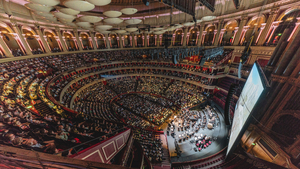Review: AMADEUS LIVE, Royal Albert Hall
The Academy of St Martin in the Fields orchestra provided a live performance of the score during this screen of the 1984 classic

![]() “There are simply too many notes, that's all. Just cut a few and it will be perfect.” Peter Shaffer’s irreverent, yet at times poignant and thought-provoking, take on the relationship between Mozart and Salieri began life as a National Theatre production – its big screen adaptation garnered accolades following its 1984 release, and retains its popularity almost 40 years later. It was first screened with an accompanying orchestra back in 2016, and is now in the middle of a European and American tour.
“There are simply too many notes, that's all. Just cut a few and it will be perfect.” Peter Shaffer’s irreverent, yet at times poignant and thought-provoking, take on the relationship between Mozart and Salieri began life as a National Theatre production – its big screen adaptation garnered accolades following its 1984 release, and retains its popularity almost 40 years later. It was first screened with an accompanying orchestra back in 2016, and is now in the middle of a European and American tour.
The soundtrack is almost exclusively comprised of Mozart’s work (and some of his most celebrated pieces at that), and was recorded by the orchestra of the Academy of St Martin in the Fields; the same orchestra was on hand to perform at the Royal Albert Hall, which made the event all the more special. On this occasion they were conducted by Benjamin Pope and joined by soloist Alexandra Dariescu on the piano – the London Philharmonic Choir provided the vocals.
For those unfamiliar with the film, it begins with aged former court composer Antonio Salieri being committed to a psychiatric hospital following a suicide attempt and ravings about having murdered Wolfgang Amadeus Mozart. The bulk of the film consists of him recounting his story to a young priest, who was curious about the details of his scandalous claims.
Salieri had long aspired to be a composer, but it took his father’s death to allow him to pursue his dreams – and he eventually rose to the position of Emperor Joseph II’s court composer. He begins to hear a lot about a prodigy by the name of Mozart and aspires to meet him, however he’s horrified at what he finds: an immature and crude man-child. The deeply religious Salieri cannot comprehend why God would gift such talents to someone like this, and there begins his rivalry with the young man – an obsession so powerful that it eventually ate away at both composers.
Although early on it may appear to be a fairly serious and historically accurate film, it quickly becomes clear that it has a slightly different tone – and the story is made all the more engaging for it. Somehow the concept of dramatisation and anachronisms still seem to be lost on a subsection of audiences, who expect anything based on a true story to be a documentary in all but name; if that were the case, we would be robbed of creativity almost entirely.
One of the most intriguing passages of the film concerns the composition of Mozart’s Requiem Mass, infamously commissioned by a messenger in black and shrouded in mystery – here our unreliable narrator remembers this as his project, with the ultimate aim of killing Mozart and claiming the work as his own. It’s a fascinating proposition that ties in wonderfully with the rest of the narrative.
It also provides the best scene of the film. As Mozart composes the “Confutatis” section of the requiem, Salieri acts as his scribe and we hear snatches of each part – this is a sequence of creative brilliance as it is, but by adding in the live orchestra and chorus it is elevated to new heights. It’s astonishing to see and hear all elements completely synchronised, given extra energy by the live nature of the event. The extra level of complexity brought by the inclusion of a chorus makes it all the more thrilling.
This is one of the oldest films so far to have been given the ‘films in concert’ treatment at the Royal Albert Hall, which I hope is a good sign of things to come in terms of future events; recent cinema re-releases of films from decades past has been an excellent scheme – particularly for those of us who weren’t in a position to see them on the big screen the first time around – and I believe this is an approach that should be echoed more in concert performances, presuming there isn’t some kind of technical hurdle that is impossible to overcome. It would have been nice, for example, to have a 60th anniversary screening of From Russia With Love including a full orchestra – perhaps this could instead be scheduled for the 70th anniversary of the original novel?
If you are a cinephile and have never seen a film in concert before, I urge you to correct this; granted, it can be a fairly expensive outing, but there’s generally a good range of films given this treatment and it is absolutely worth saving up for as a bit of a treat. Whether you’re re-watching an old favourite or finally getting round to seeing a past classic, it’s an experience that you’ll never forget.
Amadeus Live was at the Royal Albert Hall on 24 October
Photo credit: Royal Albert Hall
Reader Reviews
Videos

